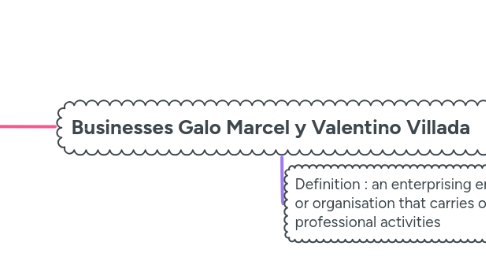
1. Private Sector
1.1. A business owned by the government
1.2. Franchises:
1.2.1. Businesses based on the use of a brand name or logo from a bigger and already existing business. The Franchisee buys the license of the company from the Franchisor and opens a store under the brand name.
1.2.2. Advantages to the Franchisor: Fast expansion of the franchise Managment of outlets is a responsability of the franchisee All products sold and used are controlled by the franchisor Disadvantages to the Franchisor: Poor managment by the franchisee could lead to bad reputation Franchisee keeps part of the profit
1.2.2.1. Advantages to the Franchisee: Chances of failure are low because its a well-known product Franchisor pays for advertisement All supplies are obtained from a central source Disadvantages to the Franchisee: Less independant Unable to make decisions that suit the local area Licence fee
1.3. Unincorporated Businesses
1.3.1. Companies with no legal identity
1.3.2. Partnerships
1.3.2.1. Limited Partnerships
1.3.2.1.1. A partnership with limited liability, has continuity if one partner dies and shares cannot be bought or sold
1.3.2.2. Association of 2 or more people who agree toown and run a business together
1.3.2.3. Advantages: More capital Losses shared Ability to specialize in different areas Disadvantages: Shared profit Loss of independent decision making Unlimited Liability
1.3.3. Sole Trader
1.3.3.1. Business owned by a single person
1.3.3.2. Advantages: Easy to control and operate Fewer reporting requierments Losses offset by incomes Disadvantages: Unlimited Liability (Owner has to pay if company goes bankrupt) Owner is responsible for everything No Continuity (Owner dies then company dies)
1.4. Incorporated Businesses
1.4.1. Private Limited
1.4.1.1. advantajes: Shareholders have limited liability (Everyone pays their share) Separate legal personality continuity in event of death of shareholders original owner still mantains an amount of contros able to raise capital from sale of shares to family. friends and employees greate shares than an unicorporated business.
1.4.1.2. disadventages: legal formalities involved in establishing the business capital cannot be raised by the sale of shares to the general public quite difficult for shareholders to sell shares.
1.4.1.3. definition: businesses not owned by the government make their own decisions. aims for profitability
1.4.2. Public Limited
1.4.2.1. definition : Businesses owned and supplied by the government
1.4.2.2. advantages: public limited company can raise more finance PLC can borrow more money shareholders have limited liability
1.4.2.3. disadvantages: plc has no control over who buys its shares profits share beteewn many people expensive to set up accounts must be published annually
1.4.3. definition: Companies with separate legal entities from owners, every partner has to pay their share of money
2. Public Sector
2.1. A goverment-owned business
2.2. Public Corporations
2.2.1. Corporations wholly owned by the government
2.2.2. Advantages: Managed with social objectives Loss-producing services kept alive if it produces enough social benefit Finance raised by the government Disadvantages: Inefficient due to strict profit targets Subsidies from the government incurage inefficiancies Government will interfere in decisions for political reasons
